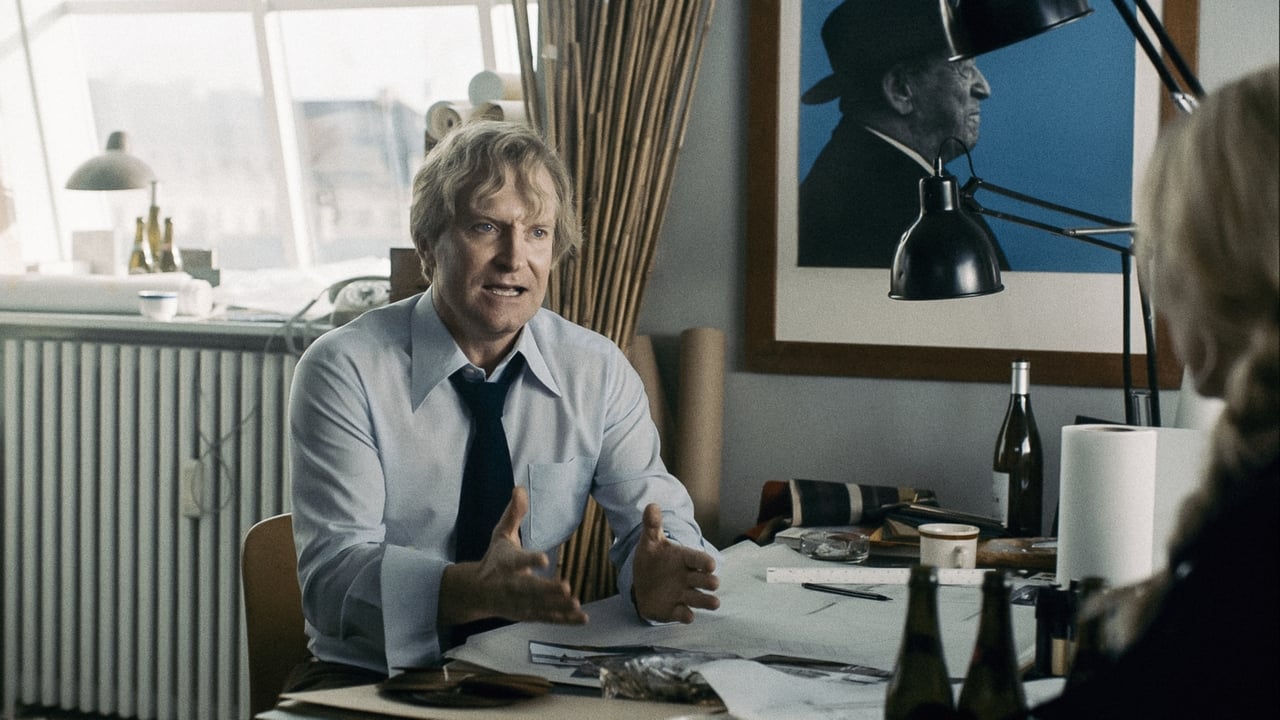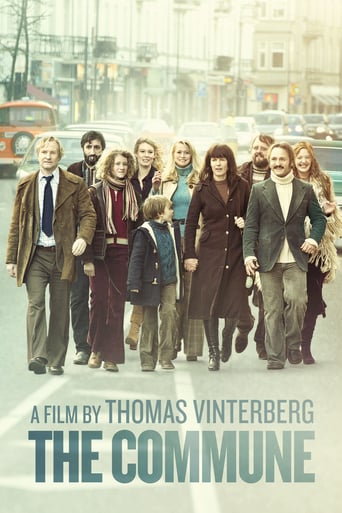

Such a frustrating disappointment
... View MoreA film of deceptively outspoken contemporary relevance, this is cinema at its most alert, alarming and alive.
... View MoreOne of the best movies of the year! Incredible from the beginning to the end.
... View MoreStrong acting helps the film overcome an uncertain premise and create characters that hold our attention absolutely.
... View MoreA middle class Danish couple find that they have inherited a rather grand house on the death of Erik's father. It is going to be too big for them and their only daughter and more over too hard to finance and so Anna suggests they invite a few others to live with them and for a 'Kollektivet' or as we would call it a commune. They waste little to no time in getting an assorted array of waifs and not so strays and soon fine that communal living bring challenges and opportunities in equal measure. Not all of them are going to be easy to grasp and the tensions, that go hand in hand with any social experiment, waste no time in pushing their way to the fore.Now I really liked this, I loved the idea of a commune having spent time in one in the eighties (when they were a bit passé to be honest) and the themes are explored here but also the lives of the main characters are mostly to the fore. This is Anna played brilliantly by Trine Dryholm – 'The Legacy' and her husband Erik (Ulrich Thomsen – 'The Blacklist') and their young daughter who is growing up much too quickly. His is from director Thomas Vinterberg who brought us 'The Hunt' in 2012 and 'The Celebration' in 1998 and I think he has an eye for style but sometimes struggles to engage, but here I think he has melded all parts of the art very well together to bring a very entertaining watch – recommended.
... View MoreThe story is not a good study of characters. All of them are almost caricatures. When the existential problem between Erik and Ana arises, both behaves in a way too much elementary, taking in account the gravity of the situation which is going on. More precisely (1) Erik is absolutely incapable to realise that he is ruining the emotional life and the self respect of the woman with whom he has been married and living in a pleasant way during at least fifteen years. A woman who proved to be generous when she accepted that Emma could live with the community, and who had probably fantasies of living a ménage à trois, along with Erik and Emma, thing that I think reasonable and human, considering what was going on. Erik sticks with Emma as if he hadn't any responsibility with regard to Anna feelings. (2) Anna is incapable to react in time to rescue her dignity which is being hurt by the irresponsible behaviour of Erik. The rest of the characters manifest themselves very poorly with respect to the crisis between Erik an Anna. Except the young Freja, daughter of Erik and Anna which is the only one capable to say that her mother must leave the community and seek for a new life. In short, Erik who is almost a pivot of the whole story, behaves - in the light of existentialist philosophy - as an individual with bad faith. I would add also, on my part, that he is a kind of mediocre individual.
... View MoreThe emotional upheaval of a tightly-knit community has become Thomas Vinterberg's trademark as a film maker. He explored this theme with great success in 'Festen' and in 'Jagten', and now he does it in 'Kollektivet'. This time, the community is a group of people living together in a large house, a way of living that was trendy in the sixties and seventies. The group consists of friends and acquaintances of architect Erik and journalist Anna. Together, they fill up the huge villa he inherited from his parents. Anna thinks this social experiment can add some spice into her life. After all, she has been married to the same man and doing the same job for fifteen years.But the cozy atmosphere of having meals and drinking beer together with a group of friends, turns sour when Erik introduces someone new into the group: his girlfriend, a young and pretty student. His wife Anna agrees with this arrangement, and in fact proposes it, hoping to keep Erik close to her. But predictably, the whole experiment ends in tears, fights and bitter reproaches.Vinterberg's film has a different tone of voice than 'Festen' and 'Jagten'. It is a bit more lighthearted, and less harsh. He not only analyzes the emotional feelings of the characters, but also shows how society has changed in the last forty years. What struck me, was how easily Erik gets away with abject male-centred behaviour. He cheats on his wife practically in front of her eyes, and seems to have hardly any emotional connection to her or their daughter. In the end, it is his girlfriend who has to point out to him that his wife is having an emotional breakdown. But even then, he doesn't see the damage he has created. Instead, he complains that all these 'women issues' distract him from his work. Nowadays, a man would get a slap in the face after saying something like that.The seventies-atmosphere adds an extra dimension to the film, and the period setting makes it an easier viewing experience than 'Jagten' or 'Festen'. At the same time, it is also less intense. It's nice to watch, but doesn't make you shift uneasily in your chair.
... View MoreThe scenery in the commune is all about the fuzz. Lovely to watch a scenery from a 70's. Fine performances by the whole crew of actors.First, the line of story has some really weak spots. The turnaround of Anna, she persuades Erik in not selling the house and start a commune with some friends. Erik feels overlooked ONE time by her wife at a joyful dinner party. Minutes later he has found relief in a student of his which becomes his second girlfriend. Anna openly accepts it in a awkward scene between Erik and Anna. Ulrich Thomsen is just one of the most awkward people to portrait the life of a couple. I didn't know whether to laugh or not. Why does Anna turn from being a the main fire of the whole commune-thing into a deep crisis? It doesn't make sense, from what we know.The woman is a very good looking and successful news host in television. She has a largely part of the Danish population of men to adore her. To me, that makes the story unreliable. The movie could have been a lot more interesting, if she went with the flow and found her own sexual way of dealing with her challenge. It doesn't make sense that she is the one who crashes and become the victim of her own free spirit. You could tell the exact same story in 2016-settings. So why use a 70s commune setting if you won't use and exploit the unique spirit of open sexual relationships? The Commune would have been a great pitch for a TV-show, likewise 'Arvingerne', 'Sommer' and so on. 10 episodes. Let's get deeper into the different characters, when the movie doesn't the have time. Why does Allon cry all the time? Why does Ole always burn other peoples stuff? Why does Mona lay with so many men? Why is Steffen so co-dependent? And let's see more about the development of the teen-years of Freja.Instead, the movie which is a love story between three people, it fails as a comedy in a commune in the lustful 70's.Indeed, Trine Dyrholm plays the role very authentically. I don't know if it is the luck of Thomas Vinterberg or maybe the movie would have been complete different without her going in destruction.Again, would have been a great episode in a TV-show. But fails as a movie.
... View More